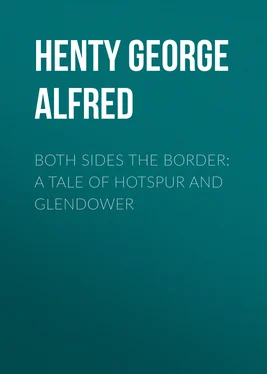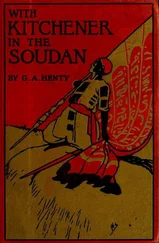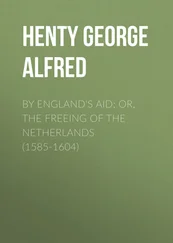George Henty - Both Sides the Border - A Tale of Hotspur and Glendower
Здесь есть возможность читать онлайн «George Henty - Both Sides the Border - A Tale of Hotspur and Glendower» — ознакомительный отрывок электронной книги совершенно бесплатно, а после прочтения отрывка купить полную версию. В некоторых случаях можно слушать аудио, скачать через торрент в формате fb2 и присутствует краткое содержание. Жанр: Альтернативная история, foreign_antique, foreign_prose, foreign_children, Исторические приключения, на английском языке. Описание произведения, (предисловие) а так же отзывы посетителей доступны на портале библиотеки ЛибКат.
- Название:Both Sides the Border: A Tale of Hotspur and Glendower
- Автор:
- Жанр:
- Год:неизвестен
- ISBN:нет данных
- Рейтинг книги:3 / 5. Голосов: 1
-
Избранное:Добавить в избранное
- Отзывы:
-
Ваша оценка:
- 60
- 1
- 2
- 3
- 4
- 5
Both Sides the Border: A Tale of Hotspur and Glendower: краткое содержание, описание и аннотация
Предлагаем к чтению аннотацию, описание, краткое содержание или предисловие (зависит от того, что написал сам автор книги «Both Sides the Border: A Tale of Hotspur and Glendower»). Если вы не нашли необходимую информацию о книге — напишите в комментариях, мы постараемся отыскать её.
Both Sides the Border: A Tale of Hotspur and Glendower — читать онлайн ознакомительный отрывок
Ниже представлен текст книги, разбитый по страницам. Система сохранения места последней прочитанной страницы, позволяет с удобством читать онлайн бесплатно книгу «Both Sides the Border: A Tale of Hotspur and Glendower», без необходимости каждый раз заново искать на чём Вы остановились. Поставьте закладку, и сможете в любой момент перейти на страницу, на которой закончили чтение.
Интервал:
Закладка:
G. A. Henty
Both Sides the Border: A Tale of Hotspur and Glendower
Preface
The four opening years of the fifteenth century were among the most stirring in the history of England. Owen Glendower carried fire and slaughter among the Welsh marches, captured most of the strong places held by the English, and foiled three invasions, led by the king himself. The northern borders were invaded by Douglas; who, after devastating a large portion of Northumberland, Cumberland, and Durham, was defeated and taken prisoner at the battle of Homildon, by the Earl of Northumberland, and his son Hotspur. Then followed the strange and unnatural coalition between the Percys, Douglas of Scotland, Glendower of Wales, and Sir Edmund Mortimer–a coalition that would assuredly have overthrown the king, erected the young Earl of March as a puppet monarch under the tutelage of the Percys, and secured the independence of Wales, had the royal forces arrived one day later at Shrewsbury, and so allowed the confederate armies to unite.
King Henry's victory there, entailing the death of Hotspur and the capture of Douglas, put an end to this formidable insurrection; for, although the Earl of Northumberland twice subsequently raised the banner of revolt, these risings were easily crushed; while Glendower's power waned, and order, never again to be broken, was at length restored in Wales. The continual state of unrest and chronic warfare, between the inhabitants of both sides of the border, was full of adventures as stirring and romantic as that in which the hero of the story took part.
G. A. Henty.Chapter 1: A Border Hold
A lad was standing on the little lookout turret, on the top of a border fortalice. The place was evidently built solely with an eye to defence, comfort being an altogether secondary consideration. It was a square building, of rough stone, the walls broken only by narrow loopholes; and the door, which was ten feet above the ground, was reached by broad wooden steps, which could be hauled up in case of necessity; and were, in fact, raised every night.
The building was some forty feet square. The upper floor was divided into several chambers, which were the sleeping places of its lord and master, his family, and the women of the household. The floor below, onto which the door from without opened, was undivided save by two rows of stone pillars that supported the beams of the floor above. In one corner the floor, some fifteen feet square, was raised somewhat above the general level. This was set aside for the use of the master and the family. The rest of the apartment was used as the living and sleeping room of the followers, and hinds, of the fortalice.
The basement–which, although on a level with the ground outside, could be approached only by a trapdoor and ladder from the room above–was the storeroom, and contained sacks of barley and oatmeal, sides of bacon, firewood, sacks of beans, and trusses of hay for the use of the horses and cattle, should the place have to stand a short siege. In the centre was a well.
The roof of the house was flat, and paved with square blocks of stone; a parapet three feet high surrounded it. In the centre was the lookout tower, rising twelve feet above it; and over the door another turret, projecting some eighteen inches beyond the wall of the house, slits being cut in the stone floor through which missiles could be dropped, or boiling lead poured, upon any trying to assault the entrance. Outside was a courtyard, extending round the house. It was some ten yards across, and surrounded by a wall twelve feet high, with a square turret at each corner.
Everything was roughly constructed, although massive and solid. With the exception of the door, and the steps leading to it, no wood had been used in the construction. The very beams were of rough stone, the floors were of the same material. It was clearly the object of the builders to erect a fortress that could defy fire, and could only be destroyed at the cost of enormous labour.
This was indeed a prime necessity, for the hold stood in the wild country between the upper waters of the Coquet and the Reed river. Harbottle and Longpikes rose but a few miles away, and the whole country was broken up by deep ravines and valleys, fells and crags. From the edge of the moorland, a hundred yards from the outer wall, the ground dropped sharply down into the valley, where the two villages of Yardhope lay on a little burn running into the Coquet.
In other directions the moor extended for a distance of nearly a mile. On this two or three score of cattle, and a dozen shaggy little horses, were engaged in an effort to keep life together, upon the rough herbage that grew among the heather and blocks of stones, scattered everywhere.
Presently the lad caught sight of the flash of the sun, which had but just risen behind him, on a spearhead at the western edge of the moor. He ran down at once, from his post, to the principal room.
"They are coming, Mother," he exclaimed. "I have just seen the sun glint on a spearhead."
"I trust that they are all there," she said, and then turned to two women by the fire, and bade them put on more wood and get the pots boiling.
"Go up again, Oswald; and, as soon as you can make out your father's figure, bring me down news. I have not closed an eye for the last two nights, for 'tis a more dangerous enterprise than usual on which they have gone."
"Father always comes home all right, Mother," the boy said confidently, "and they have a strong band this time. They were to have been joined by Thomas Gray and his following, and Forster of Currick, and John Liddel, and Percy Hope of Bilderton. They must have full sixty spears. The Bairds are like to pay heavily for their last raid hither."
Dame Forster did not reply, and Oswald ran up again to the lookout. By this time the party for whom he was watching had reached the moor. It consisted of twelve or fourteen horsemen, all clad in dark armour, carrying very long spears and mounted on small, but wiry, horses. They were driving before them a knot of some forty or fifty cattle, and three of them led horses carrying heavy burdens. Oswald's quick eye noticed that four of the horsemen were not carrying their spears.
"They are three short of their number," he said to himself, "and those four must all be sorely wounded. Well, it might have been worse."
Oswald had been brought up to regard forays and attacks as ordinary incidents of life. Watch and ward were always kept in the little fortalice, especially when the nights were dark and misty, for there was never any saying when a party of Scottish borderers might make an attack; for the truces, so often concluded between the border wardens, had but slight effect on the prickers, as the small chieftains on both sides were called, who maintained a constant state of warfare against each other.
The Scotch forays were more frequent than those from the English side of the border; not because the people were more warlike, but because they were poorer, and depended more entirely upon plunder for their subsistence. There was but little difference of race between the peoples on the opposite side of the border. Both were largely of mixed Danish and Anglo-Saxon blood; for, when William the Conqueror carried fire and sword through Northumbria, great numbers of the inhabitants moved north, and settled in the district beyond the reach of the Norman arms.
On the English side of the border the population were, in time, leavened by Norman blood; as the estates were granted by William to his barons. These often married the heiresses of the dispossessed families, while their followers found wives among the native population.
The frequent wars with the Scots, in which every man capable of bearing arms in the Northern Counties had to take part; and the incessant border warfare, maintained a most martial spirit among the population, who considered retaliation for injuries received to be a natural and lawful act. This was, to some extent, heightened by the fact that the terms of many of the truces specifically permitted those who had suffered losses on either side to pursue their plunderers across the border. These raids were not accompanied by bloodshed, except when resistance was made; for between the people, descended as they were from a common stock, there was no active animosity, and at ordinary times there was free and friendly intercourse between them.
Читать дальшеИнтервал:
Закладка:
Похожие книги на «Both Sides the Border: A Tale of Hotspur and Glendower»
Представляем Вашему вниманию похожие книги на «Both Sides the Border: A Tale of Hotspur and Glendower» списком для выбора. Мы отобрали схожую по названию и смыслу литературу в надежде предоставить читателям больше вариантов отыскать новые, интересные, ещё непрочитанные произведения.
Обсуждение, отзывы о книге «Both Sides the Border: A Tale of Hotspur and Glendower» и просто собственные мнения читателей. Оставьте ваши комментарии, напишите, что Вы думаете о произведении, его смысле или главных героях. Укажите что конкретно понравилось, а что нет, и почему Вы так считаете.












